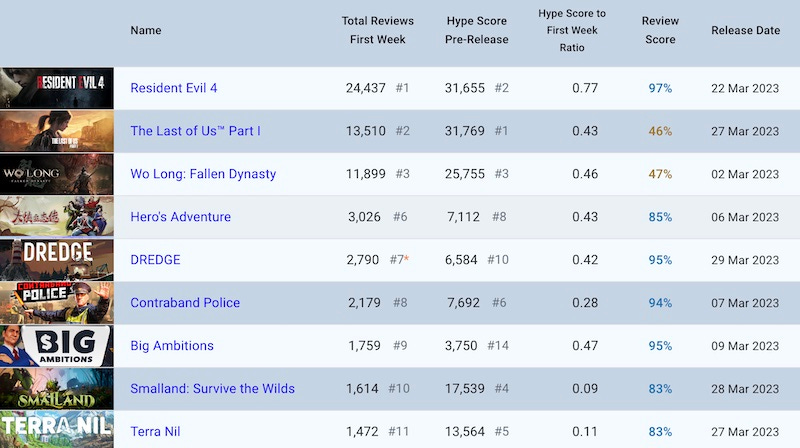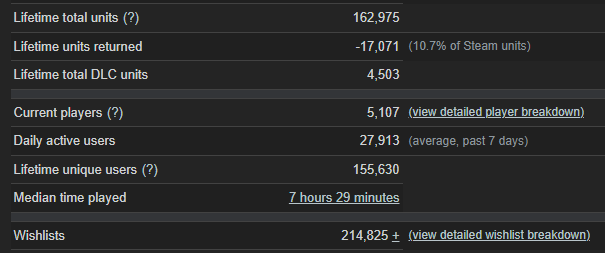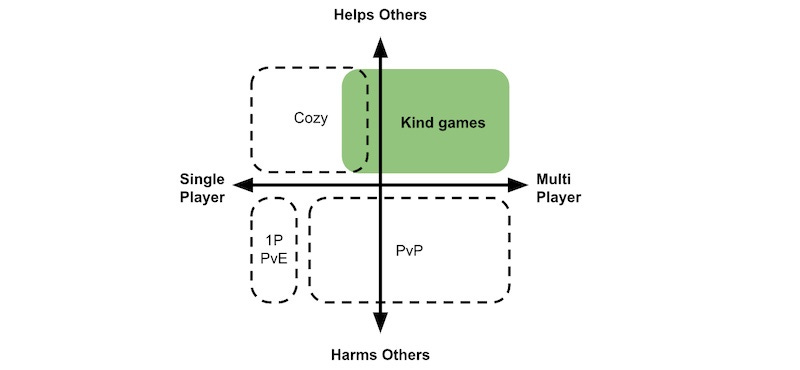Deep dive: how Big Ambitions hit it big on Steam!
Also: designing for pro-social multiplayer & looots of news.
[The GameDiscoverCo game discovery newsletter is written by ‘how people find your game’ expert & company founder Simon Carless, and is a regular look at how people discover and buy video games in the 2020s.]
We’re back, much like a snake trying to digest a particularly large prey, in terms of simultaneously analyzing another Steam hit (go, Big Ambitions!) while summarizing the news and prepping some SaaS goodness. Plate-spinning, folks - we’re a novelty act.
And final reminder - less than 48 hours to go for our 25% off all ‘Plus’ subscriptions deal. We’ve mentioned the benefits before: Discord access, extra Friday newsletter on Steam ‘Hype’ and trends, Steam-specific data back-end, etc. (Support us, we heart ya!)
Deep dive: how Big Ambitions hit it big on Steam!
If we were to tell you that one of the biggest March 2023 debuts on Steam was a broad-ranging but ‘under the radar’ Early Access entrepreneur sim called Big Ambitions, would you be surprised? (You might be, unless aware of the dev’s previous hit Startup Company.)
Anyhow, Hovgaard Games - headed by Jonas Hovgaard - is the tiny dev making Big Ambitions, which stands out due to the depth and complexity of the ‘huge business sandbox’, which has you building a life and business from scratch in New York.
One Steam player review says it’s “The Sims meets GTA meets a retail tycoon”, and it may not quite have the sheer scope of these first two titles, but it does things.. different! Jonas Hovgaard told me: “I don't think the business sim genre is generally under-served, but… it's been over-served with flat simulators cloning well-known mechanics.” (FWIW, I think the subgenre is under-served and Big Ambitions mixes things up cleverly!)
Just to illustrate how well the game has done, it’s got 3,700+ Overwhelmingly Positive (95% Positive) reviews already. It’s in the Top 10 for ‘time-adjusted total Steam reviews in Week 1’ in our monthly GameDiscoverCo Plus March post-release chart, from a total of almost 950 new games:
So that’s certainly very good. But how did it happen, and what can we learn from it? We sat down with Jonas Hovgaard himself, as well as ICO’s Lewis Burnell, who helped mastermind the marketing & streamer outreach on the game.
We’ll punctuate the Q&A with data from Big Ambitions’ Steam back end around its performance so far. As of March 28th, as you can see, the game has 163k units sold so far in about 20 days - and we’d expect another 200k+ units extra in Year 1:
Q: What do you think Big Ambitions' 'hook' is, and when you see streamers playing it, what do they really get excited by?
Jonas: I think [the hook] comes in two steps. The first happens when the [streamer or] player enters the city. They get confused, as it doesn't look like anything they saw before, and it doesn't fit their expectations of a simulation or tycoon game.
The second hook kicks in when they enter a car and realize they [can] drive it. This is where the player's imagination and dreams really kick in and they understand the depth of the concept.
Lewis: Regarding the 'hook', we pitched directly to influencers that Big Ambitions was ‘Grand Theft Auto meets Cities Skylines’. We also pitched that it was ‘House Flipper meets Two-Point Hospital’. I think that gave influencers a really firm grounding of where the game fits and what it could offer - an open-world sandbox that was creative and deep.
We pitched around 1,000 influencers including Northernlion with this brief and uptake was really good. In total we distributed nearly 200 keys to influencers, from big to small. [Notable videos or series, many non-English language, were made by: Raptor, El Escoces, Play At Home, Dan Field, Rimpac, Worth A Buy, Hirnsturz and many more.]
We also targeted influencers that had played Startup Company before (and Jonas did a brilliant job leveraging his mailing list). But the pool of those who played Startup Company and uploaded videos on YouTube or streamed on Twitch is actually fairly small.
So this allowed us to create a list of influencers who've played things like Two-Point Hospital, Farthest Frontier, House Flipper, Ark, Surviving Mars - a wide audience, across multiple genres and games.
Q: What was the biggest surprise leading up to launch or around the launch time - what happened that was different to you expected?
Lewis: For me, it was the reduced [traditional website] media coverage. The first push was largely fine, but below what I would have hoped for, despite a huge push and repeated outreach.
It's a large part of the reason we changed our approach quickly, and pushed so hard on influencers. Jonas and I always spoke about how we suspected influencers would always be key, and it has proven correct on this occasion.
We also asked Jonas and Lewis a bunch of other questions - and here’s some highlights from their answers:
European players love simulation games! Similar to Startup Company, Jonas says, German and French players responded incredibly well to Big Ambitions: “I actually always expected this to be normal within the simulation genre.” The regional split for the Top 3 is a dead heat - 16% Germany, 16% France, 16% U.S. (Then China and the UK at 6%, Canada and Korea at 4% and down from there.)
The launch wishlists were ‘just fine’ for this game, but seems like streamers took it over the top: Jonas says: “One month prior to the Early Access release we ‘only’ had 67,000 wishlists. The day before release it was 93,000.” Looks like early streamer coverage was ‘hockey-sticking’ it - look at the Steam follower chart if you don’t believe us.
The larger ‘non-niche’ market loving the game was a surprise: Jonas explained: “We had already received very positive [feedback] through playtesting, so we knew the target audience enjoyed it. But we expected the mainstream player to be much less positive.” Not so!
Localizing streamer outreach can really pay off: you see it in the above stats, but Lewis notes: “We localized all our outreach and France proved particularly potent before the launch - several large French streamers took keys. This resulted in a snowball of other French streamers seeking to play the game.”
All of the above excitement led to the following daily Steam unit sales graph, as of March 28th. This sales ‘decay curve’ is far better than many other post-launches:
So there you have it. Our main takeaway from this particular success? There are a lot of deeper sim games that the traditional press won’t love, but streamers will.
If you make an outstanding, complex game that YouTubers play for 20+ videos - like Big Ambitions - you’re sorted. And remember, it’s about game quality/depth plus discovery-centric marketing - your virality will do great things for your long tail.
Kind games: designing for pro-social multiplayer
Since this is our newsletter, and we can write what we want, we thought it’d be cool to devote a section to the game design think tank called Polaris. This is a collective that comes together once a year and then publishes some fascinating design-led ‘thought leadership’ reports for free.
Polaris, which was new in 2022 & was inspired by a previous retreat which no longer takes place, just published reports from its first conference, and we were particularly inspired by ‘Kind Games: Designing For Pro-Social Multiplayer’.
There’s some real all-stars behind this paper, including Bungie social systems design lead May Ling Tan, ProbablyMonsters senior producer JC Lau, Spry Fox CCO Daniel Cook (Cozy Grove), Google Research head of applied game design Erin Drake Kajioka & more. Summarizing their thoughts briefly:
What if we proactively design our games to facilitate positive human relationships? The paper says: “We propose that games built on a foundation of kind aesthetics can deliver greater player satisfaction, greater long term engagement, and richer human experiences.”
There’s a definition for ‘kind games’: specifically, they “encourage players to help one another and their community… players form authentic attachments that alleviate loneliness…. groups interact peacefully with each other… toxic behavior is carefully monitored and mediated… social systems foster belonging.”
Some games do ‘kind game systems’ really well: the workgroup singled out Sky: Children of Light, MMO guilds and raids (when not causing toxicity!), the subtle multiplayer hooks in Animal Crossing, and Sky predecessor Journey, “one of the earliest examples of a successful kind game.”
There are pro-social design patterns to learn from: “Social theory helps us understand first principles, but there also exist proven prosocial design patterns. Patterns and anti-patterns suggest a path forward when you are facing a tricky design problem.” The paper lists many of these design patterns, from kindness positives (‘perceived generosity’) to negatives (‘selfishness’, or scarcity problems).
A number of the other papers from Polaris are great, too, from ‘A Toolkit For Encouraging Player Stories’, through to thoughts on how you line up your game mechanics and your player experience effectively.
But the discussion of kindness particularly resonated. Why? Well, you - the developers - create the boundaries of the worlds that hundreds of millions interact in. Isn’t it a good idea to make sure you’re seeding the right emotions into those worlds?
The game discovery news round-up..
Finishing up? (And BTW, there may be a ‘newsletter break’ some time next week, since GameDiscoverCo is out of the office for the week after Easter.) Let’s take a look at the top news:
We’ve seen people complain that this Variety piece, quoting Shigeru Miyamoto as saying “Mobile apps will not be the primary path of future Mario games”, isn’t news. Well.. it’s not NOT news, also. (It’s true that Nintendo’s mobile efforts are largely intended as marketing for its owned platforms, even though some of those games got ‘out of control’ and became standalone successful.)
Did you know how poor organic Twitter reach is? Patrick Seibert reveals: “I created a fresh account and posted [game pics/GIFs] for several months during #screenshotsaturday & #wishlistwednesday On average I got 5(!) impressions.” No big surprise, but quite a contrast to what can happen on TikTok.
Very interesting to note that Amazon is testing showing the number of game hardware/software sales in the last month or week (above) on its U.S. storefront. On game hardware: “#10 PS5 +20K; #27 PS5 CF12 +10K; #29 PS5 DE +9K; #32 NSW Mario Choose One +8K; #34 PS5 +7K; #55 NSW Neon +7K; #71 X Forza +5K.” Stock availability could be affecting this, but nonetheless…
We were looking for a historical list of all Humble bundles recently. Then we discovered that Barter.vg has a giant bundles data set with all Humble game bundles listed, many of them with the final # of bundles sold, too. (When public!) Awesome stuff…
Microlinks, Pt.1: Hot Wheels gets a mixed reality playset from the Mario Kart Live: Home Circuit devs; an analysis of mobile ads for Kingdom Guard, as mobile UA gets more cut-throat; Australian government cracks down on loot boxes and in-game gambling with new age rating proposals ; look, there’s a D&D PC digital game platform too!
March 2023’s top-grossing mobile games, as relayed by MobileGamer.biz & Appmagic, include Honor Of Kings, Candy Crush Saga, Genshin Impact, and PUBG Mobile - pretty much the usual suspects. Top downloads are also semi-predictable, except a big jump for Supersonic’s hypercasual (not hybridcasual? see this great trends piece on that word!) Going Balls.
Ampere is keeping track of the number of titles on Amazon Luna, totaling 56 games less recently, also noting of the cloud gaming service: “Amazon’s decision to fold its Family and Retro channels into the main Luna+ catalogue suggests there was limited traction for this more curated approach to specific audiences.”
There were some great GDC talks about biz & marketing that might interest you. For example, Thomas Reisenegger’s ‘no one’ cares about your game lecture, as written up by GameDeveloper.com - which also ran down the best talks in these disciplines it wrote up.
Why read the complicated press release from the European Commission when you can read the Tweet? “Go repair your Switch controllers, free of charge. We contacted Nintendo to address the recurring technical problem with irresponsive Switch controllers and they agreed to offer all consumers the right to repair, free of charge, even beyond the legal guarantee!”
Microlinks, Pt.2: the value of the UK video game consumer market in 2022 was £7.05 billion ($8.78 billion), “a 5.6% dip on 2021’s figure but 17% above pre pandemic levels”; Sony says that the PS5 Store is rolling out accessibility tags globally; why Wordle guides - and game guides in general - make sense to editorial sites.
Finally, we all know the creepy F2P game ads they’re based on. But Brian David Gilbert has now made a musical version of ‘Don’t Tell Your WIFE About This Game!’:
[We’re GameDiscoverCo, an agency based around one simple issue: how do players find, buy and enjoy your PC, console and [sometimes other platform] game? We run this newsletter, and provide consulting services for publishers, funds, and other smart game industry folks.]






